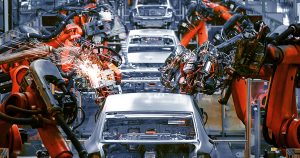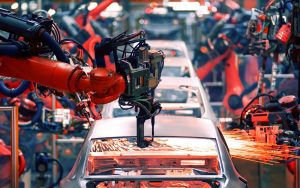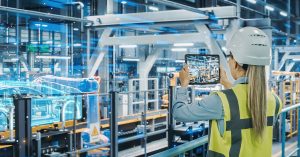
The manufacturing landscape has undergone a profound transformation with the integration of cutting-edge technologies. From automation to data analytics, technology is reshaping how products are designed, produced, and delivered. This article explores the multifaceted applications of technology in manufacturing, elucidating the impact on efficiency, quality, and the overall evolution of the industry.
**1. **Automation Revolutionizing Production Processes:**
*Overview:* Automation is a cornerstone of modern manufacturing, revolutionizing production processes across industries. Robotics, programmable logic controllers (PLCs), and autonomous systems are streamlining tasks, enhancing precision, and increasing production speed. Automated assembly lines are not only improving efficiency but also contributing to consistent product quality.
**2. **Internet of Things (IoT) and Connectivity:**
*Overview:* The Internet of Things (IoT) has ushered in an era of interconnected manufacturing ecosystems. Smart sensors and devices embedded in machinery gather real-time data, providing insights into equipment performance, production conditions, and supply chain dynamics. This connectivity facilitates data-driven decision-making, predictive maintenance, and overall process optimization.
**3. **Data Analytics for Informed Decision-Making:**
*Overview:* The application of data analytics in manufacturing is transforming how businesses make decisions. Advanced analytics tools process vast datasets, offering actionable insights into production trends, consumer preferences, and supply chain dynamics. Manufacturers can make informed decisions, optimize resource allocation, and predict market trends.
**4. **Artificial Intelligence (AI) Enhancing Efficiency:**
*Overview:* Artificial Intelligence (AI) is augmenting manufacturing capabilities, particularly in areas such as predictive maintenance, quality control, and demand forecasting. Machine learning algorithms analyze historical and real-time data, enabling systems to adapt, learn, and make decisions autonomously. AI enhances efficiency and contributes to continuous improvement.
**5. **3D Printing and Prototyping:**
*Overview:* 3D printing, also known as additive manufacturing, has emerged as a transformative technology in prototyping and production. This technology allows for the creation of complex, customized components with reduced waste and lead times. From rapid prototyping to on-demand production, 3D printing is fostering innovation and design flexibility.
**6. **Augmented Reality (AR) on the Shop Floor:**
*Overview:* Augmented Reality (AR) is finding applications on the manufacturing shop floor, providing workers with real-time information, instructions, and visualizations. AR glasses or devices overlay digital information onto the physical environment, aiding in tasks such as assembly, maintenance, and quality checks, ultimately improving workflow efficiency.
**7. **Supply Chain Management and Visibility:**
*Overview:* Technology is transforming supply chain management by enhancing visibility and coordination. Blockchain technology ensures transparency and traceability in the supply chain, reducing the risk of counterfeit products and ensuring product authenticity. Real-time tracking and analytics optimize inventory levels, minimize disruptions, and improve overall supply chain efficiency.
**8. **Cyber-Physical Systems:**
*Overview:* The convergence of digital and physical systems results in cyber-physical systems (CPS) in manufacturing. These systems integrate computational algorithms with physical processes, creating interconnected and responsive environments. CPS enables real-time monitoring, control, and adaptation of manufacturing processes for optimal performance.
**9. **Human-Machine Collaboration:**
*Overview:* Technology is fostering a new era of collaboration between humans and machines. Collaborative robots (cobots) work alongside human operators, enhancing productivity and safety. Intuitive interfaces and wearable technologies facilitate seamless interaction, empowering workers to control and monitor processes with ease.
**10. **Environmental Sustainability through Technology:**
*Overview:* Technology is instrumental in driving environmental sustainability in manufacturing. From energy-efficient machinery to waste reduction through advanced recycling technologies, manufacturers are leveraging technology to minimize their environmental footprint. Sustainable practices are integrated into manufacturing processes, aligning with global efforts for eco-friendly production.
**Conclusion:**
The application of technology in manufacturing represents a transformative force, propelling the industry into a new era of efficiency, innovation, and sustainability. From automation and data analytics to artificial intelligence and 3D printing, each technological advancement contributes to a more agile, interconnected, and adaptive manufacturing landscape. As technology continues to evolve, the industry stands poised for further breakthroughs that will redefine how products are conceived, crafted, and delivered to meet the demands of the future.





